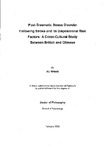Post-Traumatic Stress Disorder Following Stroke and Its Dispositional Risk Factors: A Cross-Cultural Study Between British and Chinese
| dc.contributor.author | Wang, Xu | |
| dc.contributor.other | School of Psychology | |
| dc.contributor.other | Faculty of Health | en_US |
| dc.date.accessioned | 2013-11-22T16:05:24Z | |
| dc.date.available | 2013-11-22T16:05:24Z | |
| dc.date.issued | 2008 | |
| dc.identifier | NOT AVAILABLE | en_US |
| dc.identifier.uri | http://hdl.handle.net/10026.1/2831 | |
| dc.description | Merged with duplicate record 10026.1/754 on 22.03.2017 by CS (TIS) | |
| dc.description.abstract |
Objectives: This thesis aimed to: 1) explore the subjective experiences of British and Chinese stroke patients, 2) investigate the trajectory of post-stroke PTSD and its relationship between alexithymia, health locus of control, and psychiatric co-morbidity, and 3) compare the differences between the British and Chinese samples in post-stroke PTSD, psychiatric co-morbidity and risk factors. Methods: Four focus group discussions in Britain and China were conducted for study 1. Study 2 was a prospective longitudinal design in which 90 British patients were recruited and assessed approximately 1.5 and 4 months after stroke using a battery of instruments. Study 3 was a cross-cultural study in which the data from the U.K. study above were compared with data from a group of 102 patients recruited from 3 hospitals in China, who were assessed using the same instruments described above. Results: Seven categories of participants' subjective experiences (e.g., feelings at the time of stroke; perceived causes of stroke) were identified in study 1. In study 2, 30% and 50% of stroke patients fulfilled Full and Partial PTSD at baseline which, overall, declined overtime; Stroke patients were significantly worse than the healthy control in psychiatric co-morbidity. After controlling for post-stroke physical disability, difficulty in identifying feelings predicted both PTSD and psychiatric co-morbidity symptoms. Also, alexithymia interacted with chance health locus of control in predicting post-stroke PTSD. In study 3, British patients were at greater risk for developing PTSD than the Chinese. However, Chinese patients developed more somatic problems, anxiety, and depression. For the Chinese samples, alexithymia did not predict PTSD symptoms. Rather, coping styles (i.e., chance health locus of control) were significantly associated with post-stroke PTSD and co-morbidity after controlling for post-stroke physical disability. Conclusion: Following stroke, people could experience PTSD symptoms which might change overtime and could also develop psychiatric co-morbidity. Although these psychological reactions existed in patients regardless of cultural differences, the way in which risk factors associated with outcomes changed depending on cultures. | en_US |
| dc.language.iso | en | en_US |
| dc.publisher | University of Plymouth | en_US |
| dc.title | Post-Traumatic Stress Disorder Following Stroke and Its Dispositional Risk Factors: A Cross-Cultural Study Between British and Chinese | en_US |
| dc.type | Thesis | |
| plymouth.version | Full version | en_US |
| dc.identifier.doi | http://dx.doi.org/10.24382/3430 | |
| dc.identifier.doi | http://dx.doi.org/10.24382/3430 |
Files in this item
This item appears in the following Collection(s)
-
01 Research Theses Main Collection
Research Theses Main


